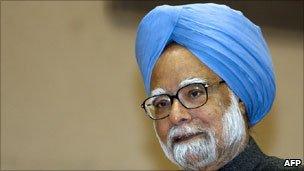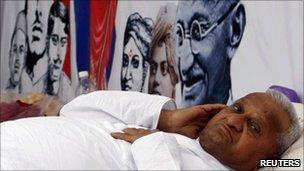India PM: 'Hunger strikes will not help fight graft'
- Published

Mr Singh has promised a crackdown on corruption
Indian Prime Minister Manmohan Singh has said hunger strikes by campaigners will not help in fighting corruption.
Mr Singh's remarks came a day ahead of a planned fast by activist Anna Hazare against a proposed new anti-corruption law that the government has presented to parliament.
Mr Singh promised what he called the "strictest" action against graft and promised a strong anti-corruption law.
India has recently been hit by a string of high-profile corruption scandals.
Mr Hazare has said the Lokpal (Citizen's Ombudsman) Bill was a "cruel joke" and pledged to go on hunger strike from Tuesday in protest.
He and civil society representatives have been pushing the government for a strong ombudsman that will have the power to investigate corruption charges against the prime minister, senior judges and MPs, among others.
But the government has refused to include the prime minister and senior members of the judiciary in the ombudsman's remit.
'No magic wand'
Addressing the nation on India's Independence Day, Mr Singh said only parliament could decide on the new law.
"I am aware of the differences of opinion on some aspects of the bill. Those who don't agree with this bill can put forward their views to parliament, political parties and even the press. However, I also believe they should not resort to hunger strikes and fasts-unto-death," he said.
Mr Singh said the government had no "magic wand" to deal with corruption, which needed to be tackled on many fronts.

Anna Hazare has pledged to begin a second hunger strike against corruption
"Everyone should know that quick action will be taken against the corrupt and punishment meted out to them," he said.
Mr Hazare and the government appeared to be heading for a showdown after the government said on Sunday that his move to go on a hunger strike was "undemocratic and an affront to the parliament".
The ruling Congress party also accused Mr Hazare for indulging in corrupt practices - alleging that Mr Hazare's non-governmental organisations had spent money "illegally", not submitted its accounts regularly, and that some of his anti-graft campaigners were involved in "anti-social activities."
Mr Hazare has denied the charges, saying that the allegations were baseless and asked the government to investigate the charges.
Some of the recent corruption scandals to have rocked India include a multi-billion dollar alleged telecoms scam, alleged financial malpractices in connection with the Delhi 2010 Commonwealth Games and allegations that houses for war widows were diverted to civil servants.
Critics of the government say that recent scandals point to a pervasive culture of corruption in Mr Singh's administration.
A recent survey said corruption in India cost billions of dollars and threatened to derail growth.
- Published4 August 2011
- Published13 June 2011
- Published18 April 2012
- Published15 March 2011
- Published3 March 2011
- Published18 January 2011
- Published18 November 2010